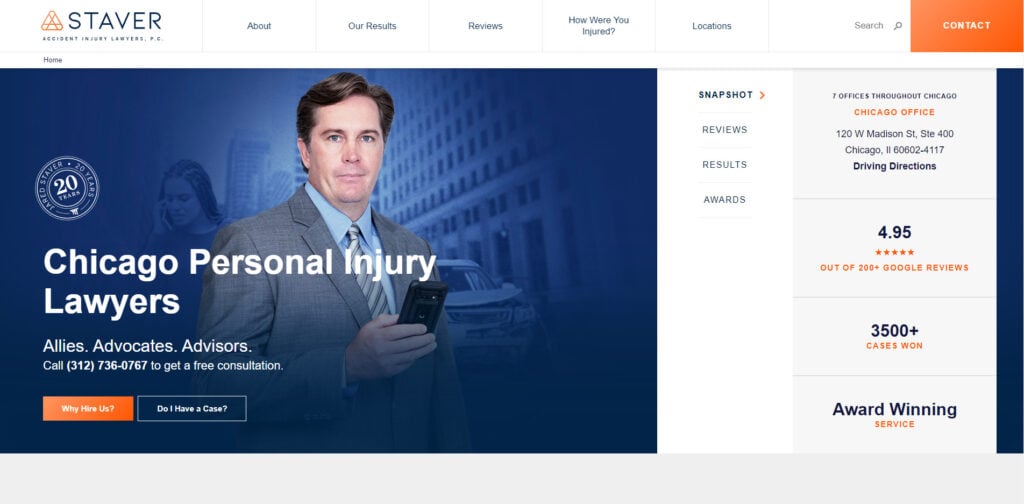Most law firm sites suck. They use generic stock photos of smiling lawyers, walls of text, and glitchy call-to-action buttons.
But these 60 absolutely crush it. They rank on Google in 2025 (even showing up in AI tools like ChatGPT), and no doubt pull in leads like crazy.
Most people form an opinion about your site in 0.05 seconds. That means you have less than the blink of an eye to prove you’re the attorney to hire.
Ready to get inspired? We’ve rounded up a list of 60 of the top law firm website designs. Whether you’re a solo attorney or a multi-office firm, feel free to borrow their ideas.

1. Hodgson Law Offices
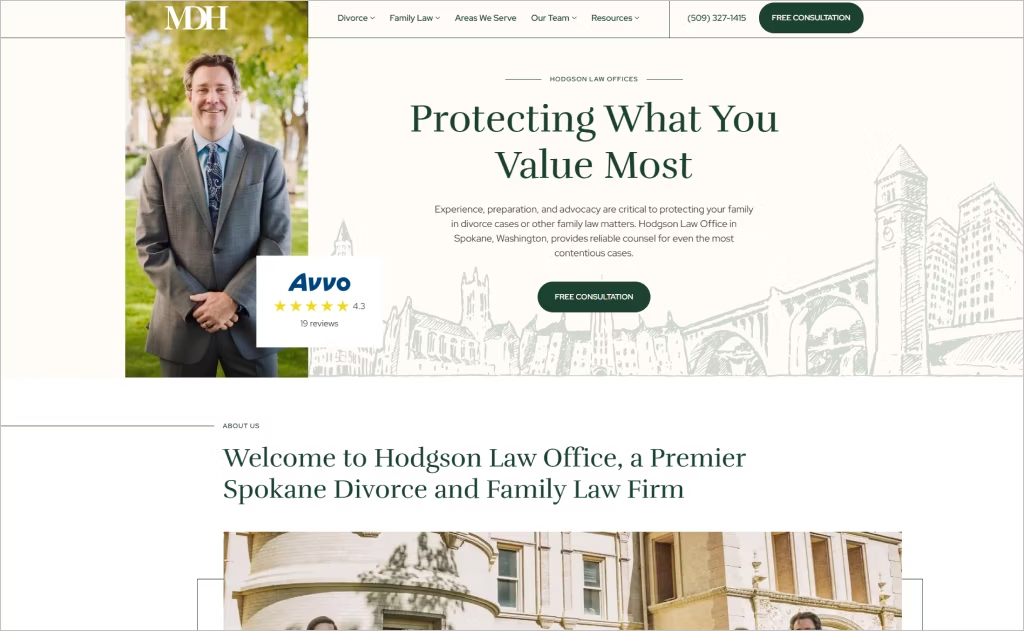
Founded in: 2003
Practice area: Divorce and family law
Hodgson Law Offices kicks us off strong! Their family law firm website is impeccable.
It has 3 elements that stressed clients in family disputes need to see in a design: it’s informative, user-friendly, and welcoming.
The homepage headline, “Protecting What You Value Most,” sets the tone instantly. Notice that instead of legal-heavy copy, visitors are directed to divorce, custody, and property division services. Plus, the client testimonials bring a really nice personal touch!
The real proof is in the numbers: After their redesign, courtesy of our team, Hodgson Law saw a 478% surge in organic traffic, 105% more organic leads, and a 71% drop in cost per lead, with 4× more form submissions and 7× more calls!
2. Lehmbecker Law
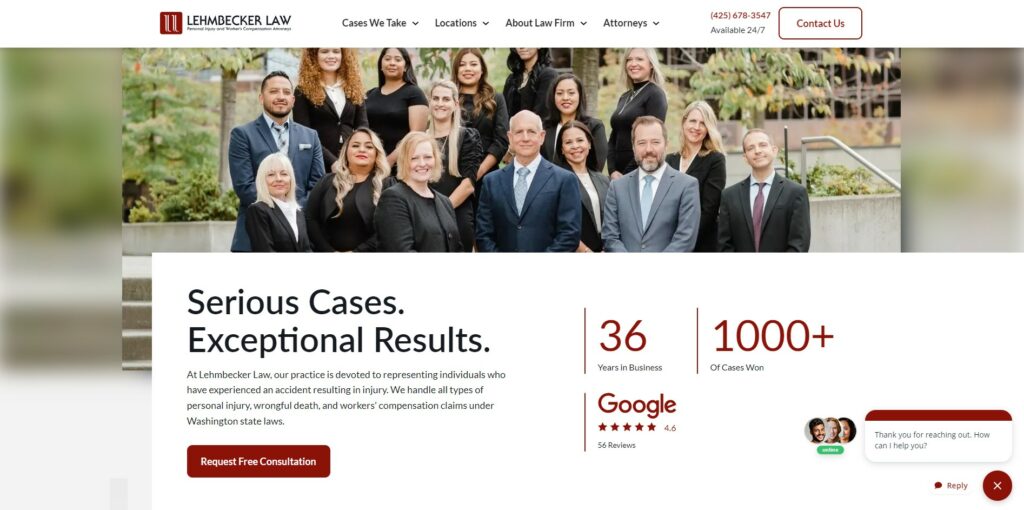
Founded in: 1986
Practice area: Personal injury, wrongful death, workers’ compensation, and more
Have you seen Lehmbecker Law’s site yet? If not, you have to check it out. “Serious Cases. Exceptional Results” is an impactful headline that sets the tone for a site built on confidence and compassion.
Credibility is everywhere: 38 years in business, 1,000+ cases won, 4.8-star reviews, and real case results like a $6M pedestrian injury settlement.
The redesign was handled by our team and absolutely delivered. Lehmbecker saw a 1,425% surge in organic traffic, a 1,067% jump in leads, and a 645% ROI. That’s lawyer web design executed perfectly, if we do say so ourselves.
We specialize in SEO for Personal Injury lawyers and attorneys in competitive markets to rank for the most coveted keywords
3. SimVisa

Founded in: 2007
Practice area: Immigration law, including family-based immigration, citizenship, employment-based immigration, and other visas
Immigration cases are stressful. Your clients’ future is on the line.
SimVisa’s website understands that. Right from the header, “SimVisa has helped thousands of families reunite and build a future,” it’s focused on reuniting loved ones.
Visitors are greeted with plenty of street cred: 98% success rate, 17+ years of experience, and easy options to either hire an attorney or choose a budget-friendly self-file service.
This lawyer web design is clean and modern, with step-by-step “How It Works” visuals and real success stories, which instantly reduces anxiety for clients.
After their redesign and marketing campaign, SimVisa saw a 1,100% jump in qualified leads, a 661% boost in organic traffic, and a 98% drop in cost per lead.
Rank higher in search results for immigration law keywords. Learn the secrets of SEO for immigration lawyers
4. Barr & Douds Attorneys
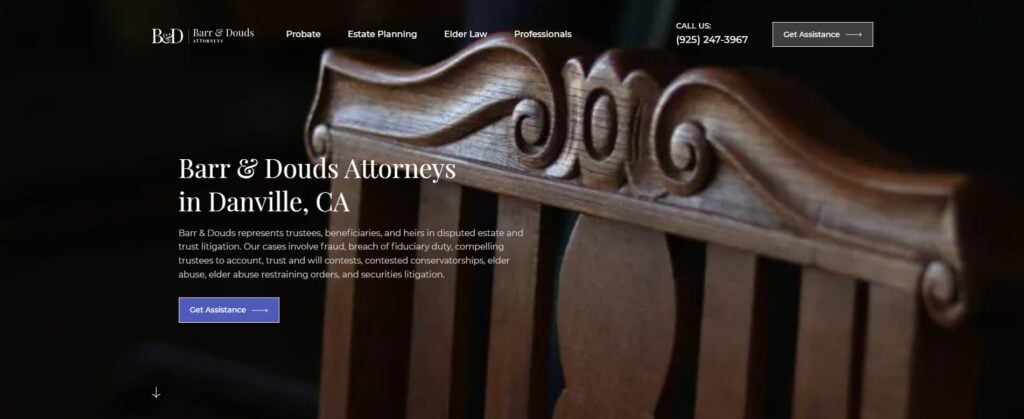
Founded in: 1998
Practice area: Trust litigation, elder abuse, and more
Website technology: WordPress
Another worthy contender on our list! Barr & Douds’ website is a subtle nod to classic, old-school law firm web designs.
Their message is confident: experienced attorneys who are deeply rooted in Northern California, with partners recognized as Super Lawyers year after year. Visitors immediately see proof points like 400+ litigation clients served and bilingual staff ready to assist.
Their website redesign came through as Barr & Douds saw a 937% surge in leads, 4,774% more organic traffic, and an 87% drop in cost per lead. This is an example of lawyer web design executed with flair.
5. Stracci Law Group
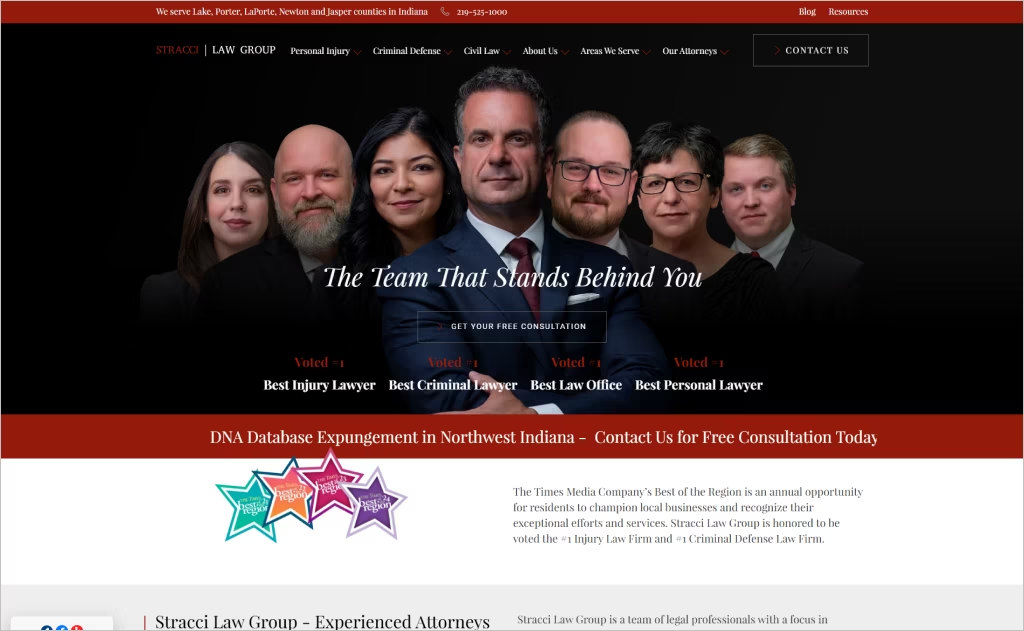
Founded in: 2019
Practice area: Personal Injury, Criminal Defense, Civil Law
Stracci’s website is a study in authority. The headline says it all: “Relentless Representation.”
Trust signals are everywhere: #1 Injury Law Firm, #1 Criminal Defense Law Firm, 4.9 stars with 400+ reviews, and badges like Super Lawyers, Avvo, and Million Dollar Advocates.
It’s not just a pretty face in the legal industry. After the redesign and SEO (search engine optimization) rebuild, Stracci recorded a 7,146% jump in organic traffic, 1,591% more qualified leads, and a 91% drop in cost per lead. If you want a clean, hard-hitting criminal defense site that converts, this is the blueprint.
Ready to dominate search results? Learn about SEO for personal injury lawyers in our comprehensive guide.
6. Sequoia Legal
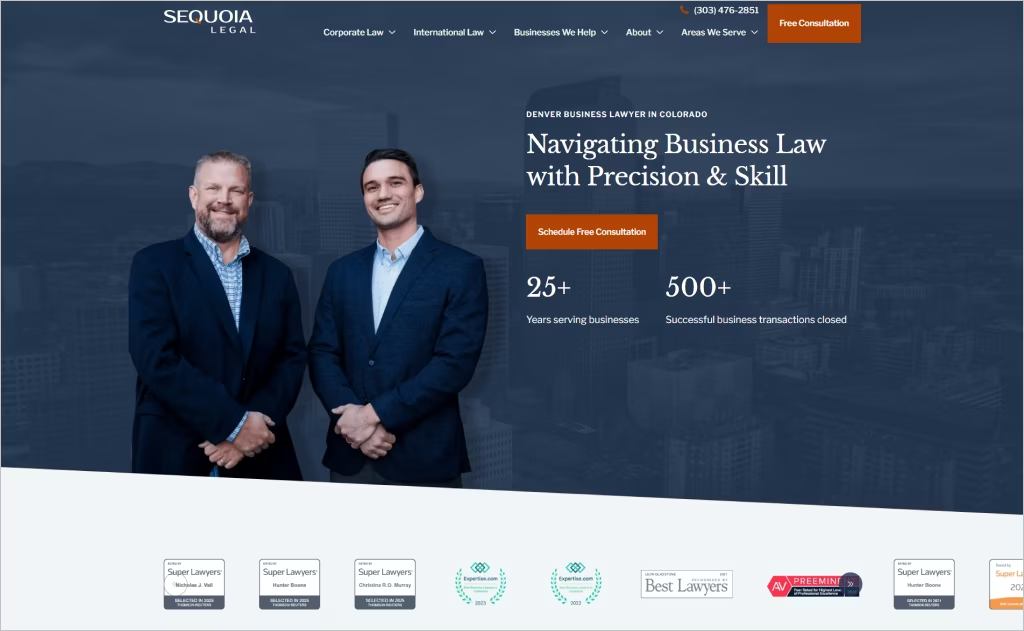
Founded in: –
Practice area: Business law, corporate law, and international trade
Some attorney websites drown you in legalese. Not Sequoia Legal.
Right from the homepage, you see their promise: “Navigating Business Law with Precision & Skill.”
The design is crisp with white-and-blue accents, and the layout makes it easy to explore services like contracts, business formation, or export control without clicking in circles.
What really stands out is their credibility: a great trust factor for new clients. They highlight 25+ years in business and 500+ successful transactions.
After a full redesign and SEO overhaul, Sequoia Legal saw a 6,700% spike in organic traffic, a 138% increase in qualified leads, and a 57% drop in cost per lead. Proof that client-first, great law firm websites win big!
7. Venditti Law Group
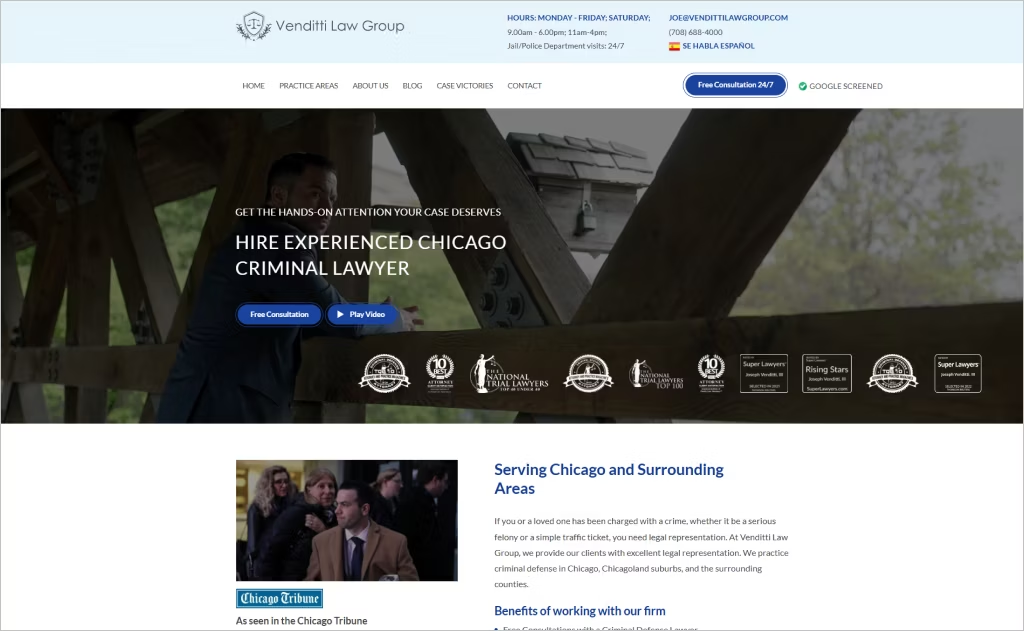
Founded in: 2018
Practice area: Criminal defense, DUI, domestic violence, traffic law, immigration, divorce
What’s the first thing you see on Venditti Law Group’s site? Bold copy like “Free Consultation” and even “Jail Visits 24/7.” That alone tells you this firm is serious about being there when clients need them most.
The sleek blue-and-white design keeps things simple and enhances the client experience. Plus, we love that their practice areas (from DUIs to immigration) are easy to find, while the blog covers real-world issues.
You’ll notice that what makes this attorney’s website especially strong is the personal touch. Joseph Venditti doesn’t just run the firm; he promises hands-on representation in every case.
8. Lawyer For Business
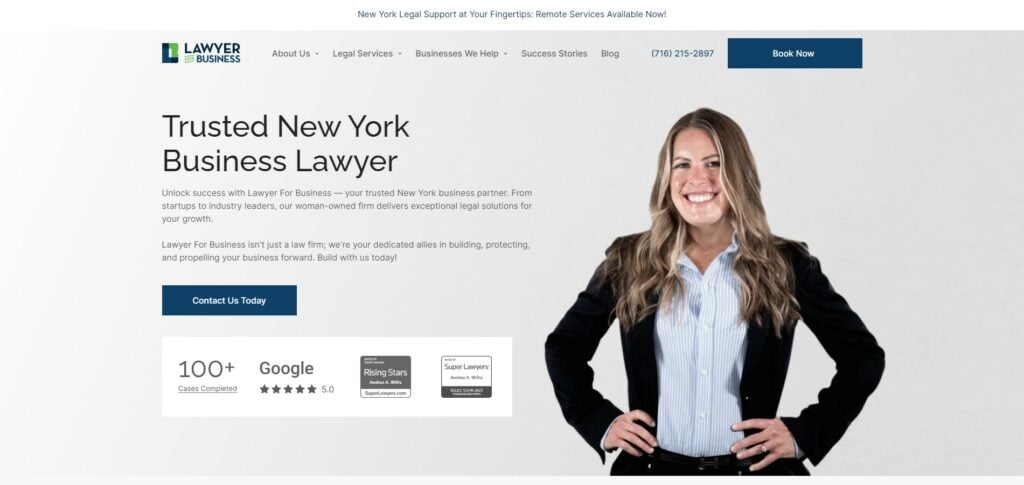
Founded in: –
Practice area: Business contacts and agreements, business organizations and transactions, license applications
Open the Lawyer for Business site and you’ll immediately feel at home. You’re greeted with clean, straightforward messaging that speaks directly to New York entrepreneurs.
Navigation is simple, and everything is right where you expect it. The uncluttered blue-and-white design keeps the focus on clarity, while CTAs like “Schedule a Consultation” guide you forward.
Among the many attorney websites for business law we’ve seen, this one stands out by a mile with its authority and approachability. Definitely use it as inspo for your own website.
9. Omar Ochoa Law Firm
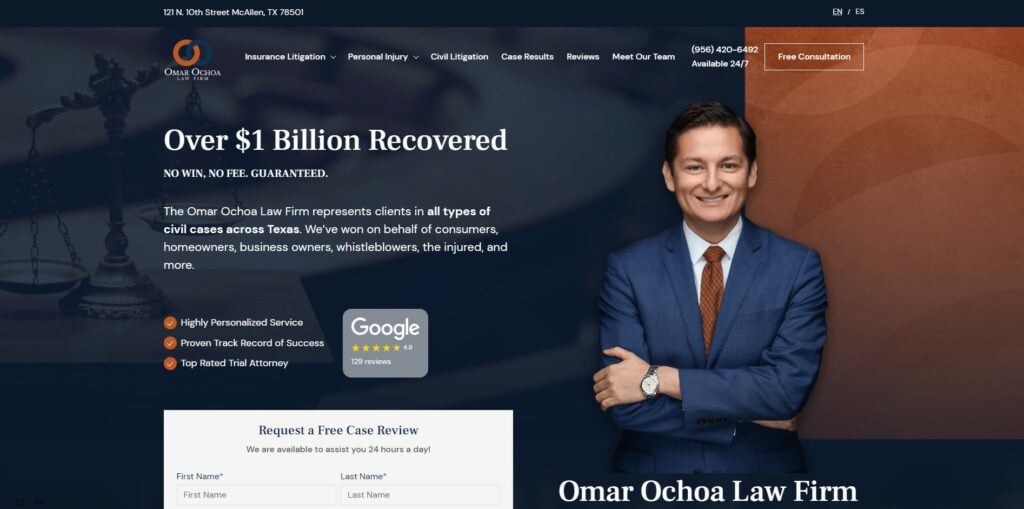
Founded in: –
Practice area: Personal injury, insurance litigation, civil litigation
What do you notice first on Omar Ochoa Law Firm’s website? It’s the confidence!
Bold headlines highlight over $1 billion recovered for clients, backed by verdicts like $14.5 million in a business dispute and $10 million for Hurricane Hanna property damage claims.
Clients love to see that kind of proof.
The design itself is sharp and professional. We especially like the attorney photos placed throughout the site. This law firm web design makes one thing clear: Omar Ochoa is more than your run-of-the-mill trial lawyer, he’s a fighter for his clients.
10. Oresky Law
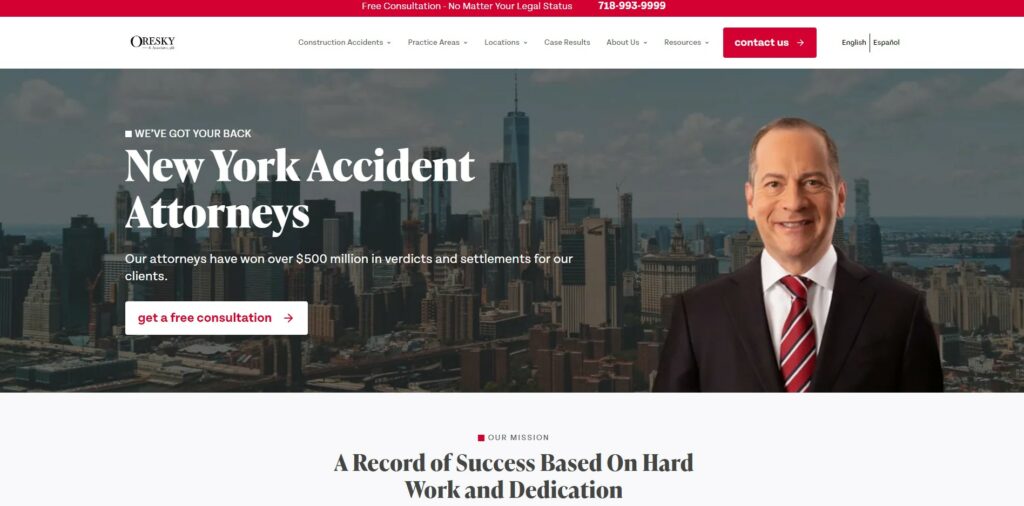
Founded in: 1992
Practice area: Personal injury and construction accidents
If you’ve spent time in New York, you’ve probably seen Oresky’s name around. They are an institution!
Oresky’s site reflects that. The bold red-and-white design sets a confident tone, while stats like $500+ million recovered and 30+ years of experience instantly build trust.
We also like how their client testimonials and case results are front and center ($18 million, $9.9 million, $8.75 million verdicts), proof of real wins for real people.
Navigation is incredibly straightforward. All in all, you’ve got an insanely well-built law firm web design that speaks directly to New Yorkers in need of an expert in the legal profession.
11. HagEstad Law Group

Founded in: –
Practice area: Business law, estate & probate, civil litigation, real estate law
Take notes! HagEstad Law Group’s website echoes trust. You can’t miss its crisp blue-and-white design and splashy headline: “Protecting Your Legal Interests in Montana & Arizona.”
The layout is straightforward, making it easy to explore services like estate planning, probate, business disputes, and real estate law.
What we like most is that the client testimonials are front and center, along with clear contact options… both of which reinforce accessibility.
This law firm’s web design also highlights key proof points: 30+ years of combined experience, 1,000+ clients served, and millions saved. We’d give their web presence 10/10.
12. Cohen & Marzban
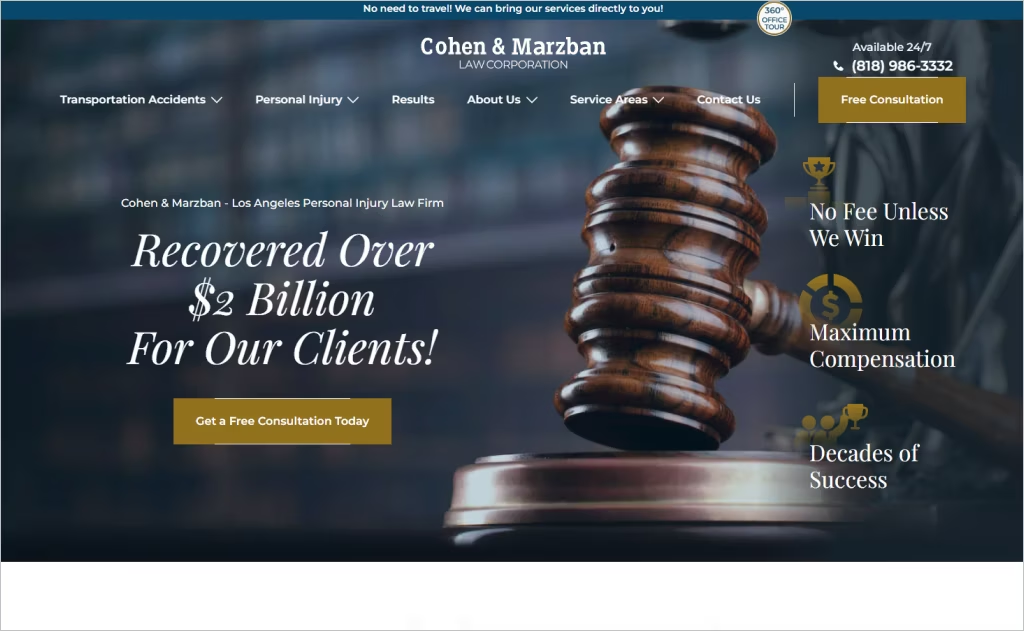
Founded in: 1982
Practice area: Personal injury: car accidents, wrongful death, premises liability, construction accidents, and more
You’re about to see why Cohen & Marzban’s site ranks among the best law firm websites.
Right away, you see their street cred: “Recovered Over $2 Billion for Our Clients.” That kind of credibility hits hard. Plus, it’s backed by pages of real case results, from an $18 million construction accident verdict to multimillion-dollar motor vehicle settlements.
The design uses a classic blue-and-gold palette that feels powerful. Clear navigation puts everything at your fingertips. This whole site is wonderfully put together.
Looking to boost your client base and stand out in the competitive field of personal injury law? Discover the most effective strategies for getting leads with personal injury lawyer marketing
13. Jacob D. Fuchsberg

Founded in: 1980
Practice area: Medical malpractice, personal injury, and civil rights
This is a masterclass in great web design! From the moment you land, the bold headline — “We Can Help When the Unimaginable Happens” — sets an empathetic tone.
Take note of the clean, modern layout that highlights massive verdicts ($130M in a civil rights case, $8M in medical malpractice), leaving no doubt about the firm’s credibility.
We’d guess that a potential client’s first impression is probably positive with their treasure trove of real testimonials. It’s proof that the best law firm websites combine authority with compassion.
14. Exceed Legal
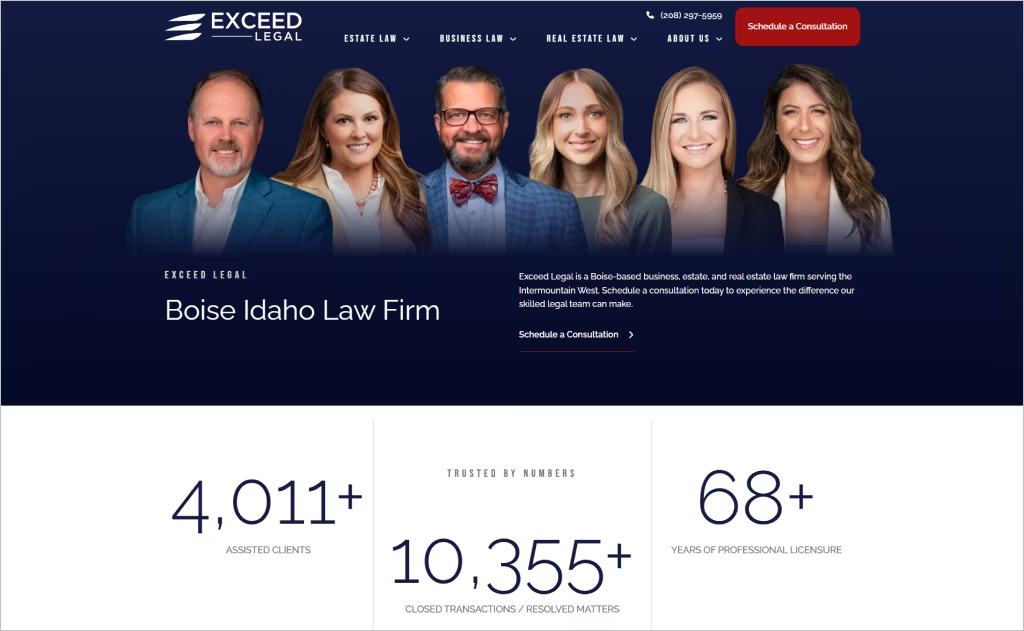
Founded in: 2016
Practice area: Estate planning & probate, business law, real estate law
Exceed Legal’s header visuals are beautiful. It catches the eye right away and makes a strong impression with images of welcoming lawyers, which is extremely reassuring.
The site highlights impressive numbers: 4,000+ clients served, 10,000+ matters resolved, and decades of combined experience. Everything is presented in a clean design and straightforward navigation.
When you’re building a site, borrow from Exceed Legal’s principles. The best law firm web design isn’t about “flash”, but about clarity.
15. Cameron Law
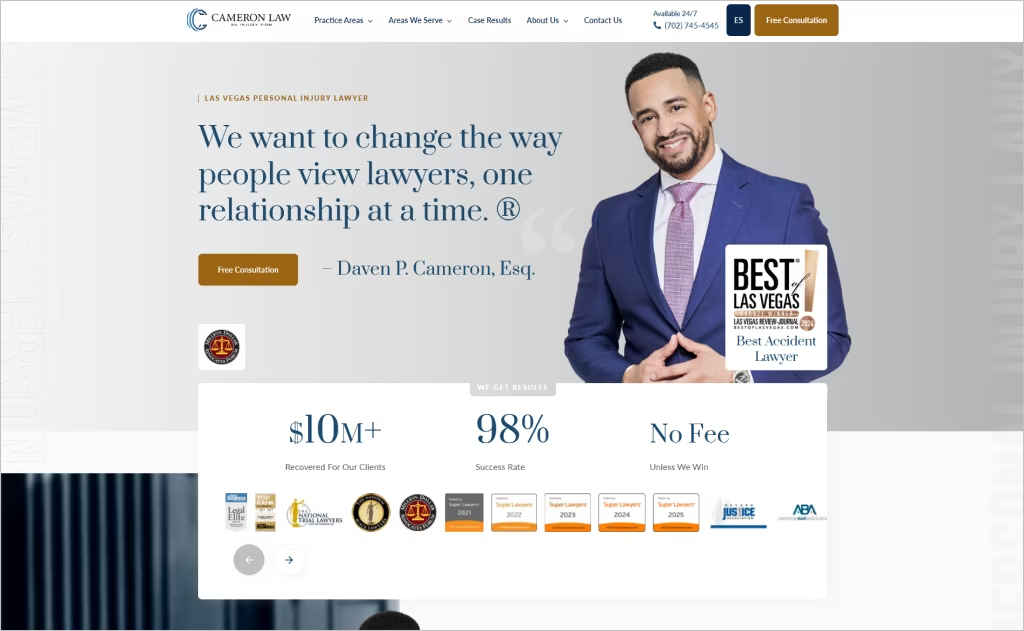
Founded in: –
Practice area: Personal injury, wrongful death, product liability, premises liability, and more
It’s clear that Cameron Law wants to change the way people view lawyers, one relationship at a time. From the moment you land on their site, that promise feels real.
The homepage highlights what matters most to accident victims: a 98% success rate, $10M+ recovered, and a “No Fee Unless We Win” guarantee.
With 24/7 availability, Spanish-language support, and a strong community presence, Cameron Law’s web design blends trust, results, and empathy seamlessly.
16. Fellows Hymowitz Rice

Founded in: 1981
Practice area: Personal injury, including auto accidents, workplace injuries, medical malpractice, construction accidents, and wrongful death
Another stellar website that’s worth a look!
Fellows Hymowitz Rice has been fighting for accident victims across New York for more than 40 years, and their website reflects that wealth of experience.
The bold blue-and-white law firm website design projects trust and authority, while the tagline “Maximum Results. Minimal Stress.” makes their mission crystal clear.
What really stands out are the case results: $8.3M municipal liability settlement and $8M+ birth injury recoveries. Take notes, this website should be on your inspo shortlist!
17. Gounaris Abboud, LPA
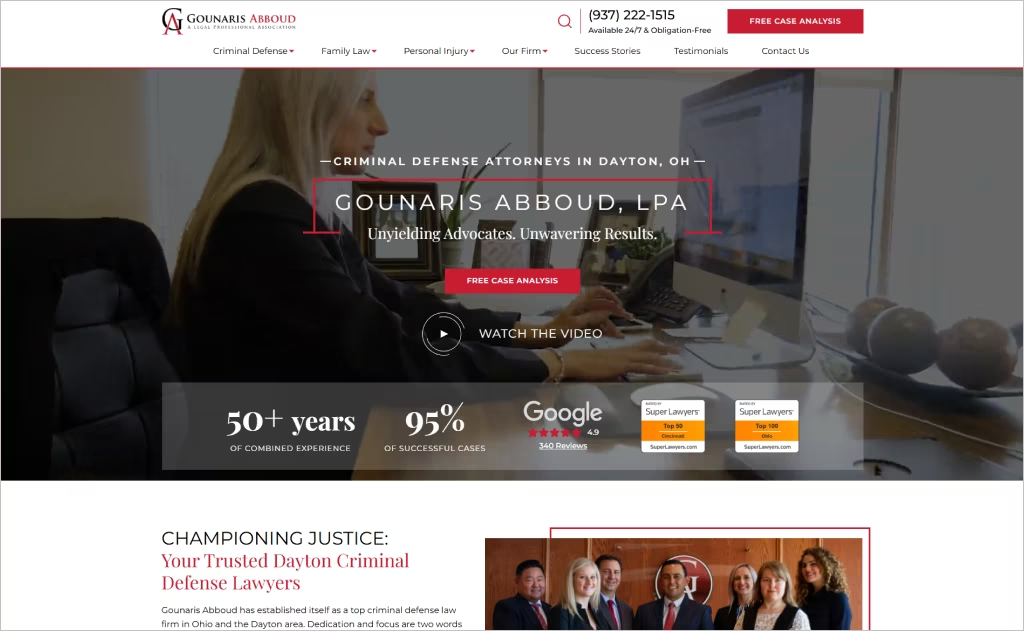
Founded in: –
Practice area: Criminal defense, DUI/OVI, family law, personal injury
Step onto the Gounaris Abboud site and you’re met with their motto: “Unyielding Advocates. Unwavering Results.” With 50+ years of combined experience and a 95% success rate, their credibility is clear from the start.
The design strikes a perfect balance: sharp and authoritative, but still approachable. Attorney photos are spread throughout the site… a great touch!
Plus, navigation is clean and practical, guiding you through criminal defense, DUI, family law, and personal injury with ease. This is a masterclass in our list of the best law firm websites.
18. Moore Ganske Murr PLLC
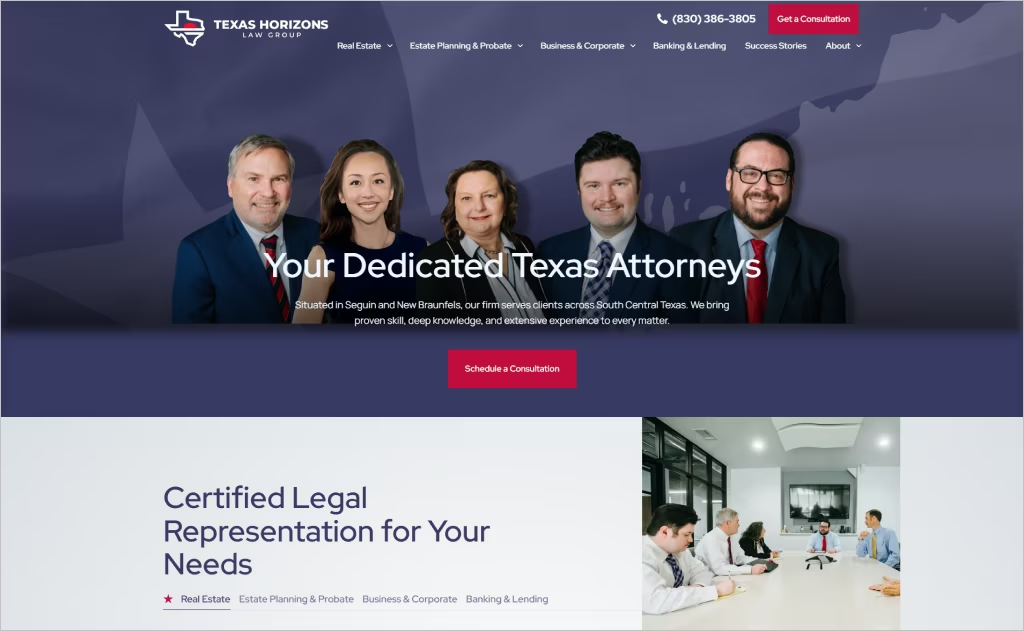
Founded in: 2019
Practice area: Real estate law, estate planning & probate, business & corporate law, banking & lending
What sets Texas Horizons apart? Take a look for yourself! Their site makes you feel like you’re in good hands as you arrive on the home page and see warm, smiling images of their attorneys.
Instead of legal jargon, you see real client stories: like stopping a foreclosure in just 2 days or probating a ranch across 2 counties. Those practical wins are an instant trust-booster.
You’ll notice that this law firm website design has clear navigation, which clients love. By blending board-certified expertise with local roots in Seguin and New Braunfels, the firm shows they’re both approachable and battle-tested.
19. Michles & Booth, P.A.

Founded in: –
Practice area: Personal injury, auto accidents, motorcycle accidents, medical malpractice, and more
Michles & Booth doesn’t hold back: the first thing you see is their eye-catching header: “INJURED? Don’t Be a Victim Twice!™” with a great video that auto-plays to capture interest.
That sets the tone for a firm that fights hard while keeping things human.
Their website makes it easy to find exactly what you need. Case results like a $26.2M jury award prove they deliver big wins.
With board-certified trial specialists, 24/7 availability, and even a medical doctor on staff, this is one law firm website that echoes a powerful, people-first tone.
20. Yarborough Law Group
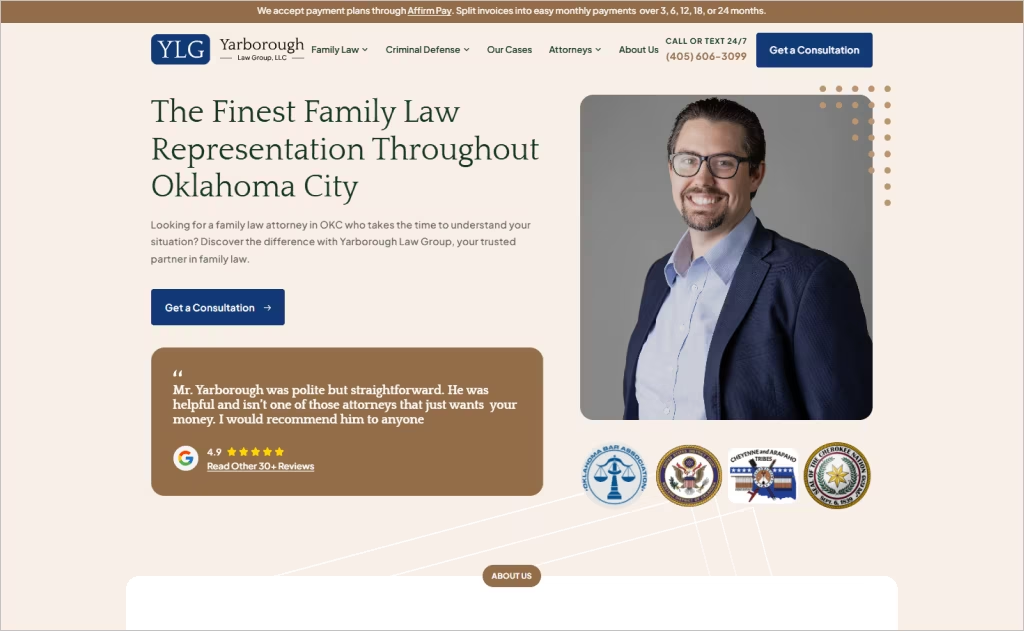
Founded in: –
Practice area: Family law, criminal defense
What we love about Yarborough Law Group is how personal it feels. The beige-and-blue design creates a calm, welcoming atmosphere, with plenty of social proof (client reviews) right at the top.
The navigation is clean, with subtle animations as you scroll to hold your attention. They follow this up with smiling images of their attorneys along with their creds… a great way to humanize their brand.
Take note, this is a law firm website design with touches of warmth, clarity, and a focus on real people.
21. Davis Wright Tremaine LLP

Founded in: 1944
Practice area: Litigation, environmental law, and more
Davis Wright Tremaine takes a refreshing approach to law firm website design.
Instead of overwhelming visitors with menus and clutter, the homepage greets you with something familiar: a search bar. It’s a clever nod to how most of us navigate the web by searching first.
This design choice doesn’t sacrifice usability, either. Clear navigation links sit neatly at the top, giving visitors direct access to practice areas, attorneys, and insights.
This site feels modern, user-friendly, and perfectly aligned with the firm’s innovative reputation.
22. Axiom
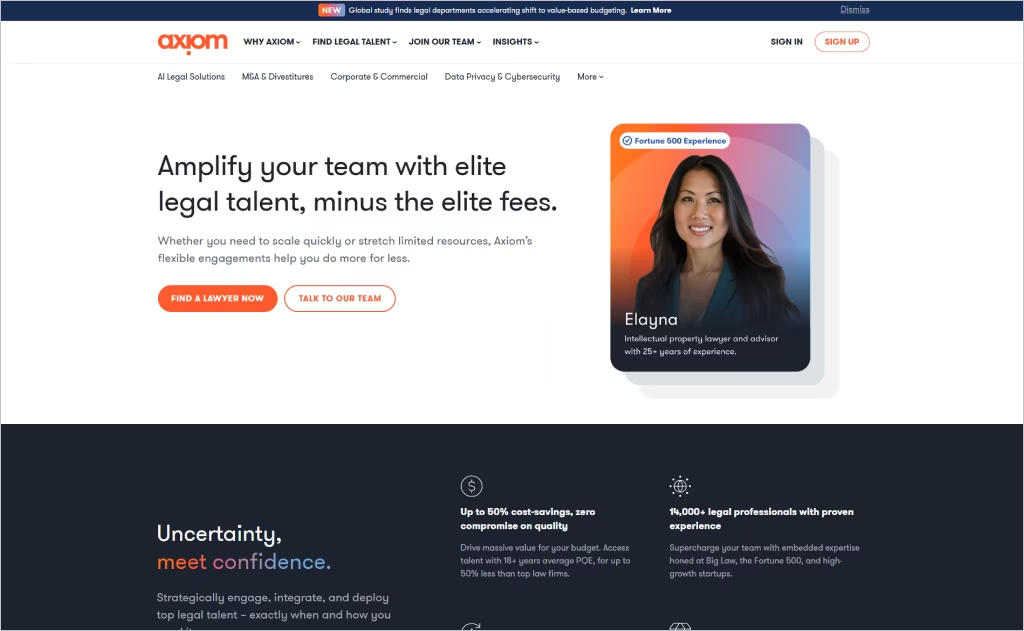
Founded in: –
Practice area: Contract law, finance law, and more
Axiom doesn’t look or feel like a typical law firm site… because it isn’t a law firm.
Instead, they work more like a legal talent marketplace. Companies that need extra help can hire vetted lawyers for short-term or long-term projects, without paying “big law” fees.
The homepage emphasizes cost savings (up to 50% less than Am Law 200 firms) and flexibility, while the about page reinforces what makes them different: only 3% of applicants make the cut, and clients can tap into a global network of 14,000+ lawyers. A brilliantly done site!
23. McCarthy Tetrault
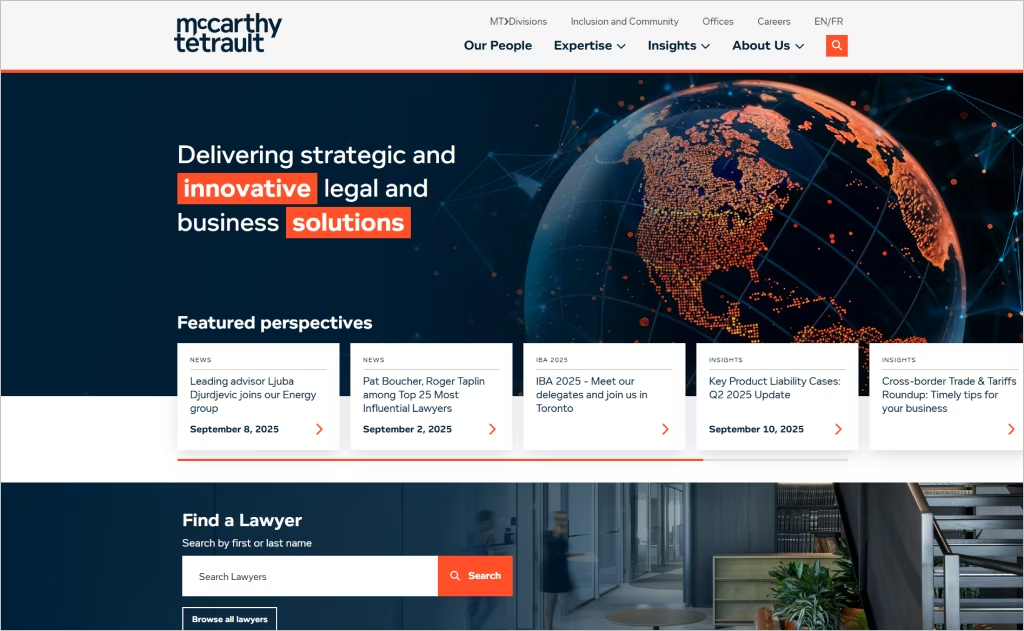
Founded in: 1855
Practice area: Business law, litigation, tax, real estate, and more
If you’re looking to build an eye-catching site, check out McCarthy Tétrault’s website.
It stands out with its bold blue-and-orange palette and a tagline that sums up its mission: “Delivering strategic and innovative legal and business solutions.”
The site showcases recent multimillion-dollar deals, cross-border expertise, and community initiatives. It’s a strong example of law firm website design that positions McCarthy Tétrault as both innovative and approachable.
24. Kasowitz Benson Torres

Founded in: 1993
Practice area: Business, estate litigation, and more
Kasowitz Benson Torres embraces an avant-garde aesthetic! It immediately stands out from more traditional law firm websites.
Take note of the design. It’s intentionally sparse, leaning on bold typography and striking black-and-white imagery to project confidence and focus.
This minimalist approach keeps distractions at bay and reflects the firm’s culture of relentless, results-driven advocacy.
The effect is modern, sophisticated, and perfectly aligned with a firm that thrives on high-profile, high-stakes litigation.
25. TSMP Law Corporation

26. Staver Accident Injury Lawyers, P.C.
27. Groom Law Group
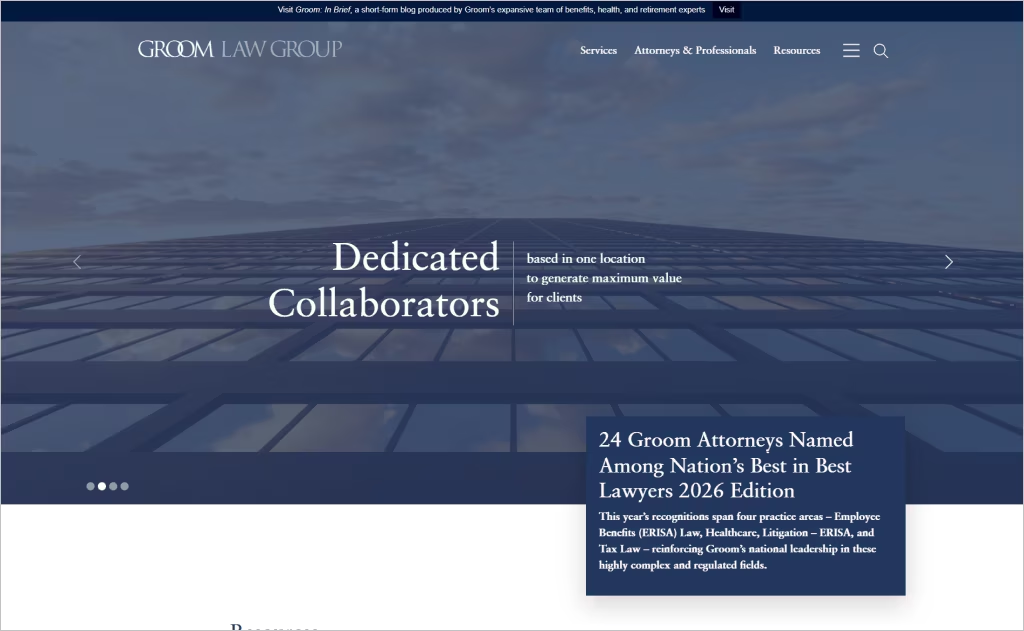
28. YLaw Group
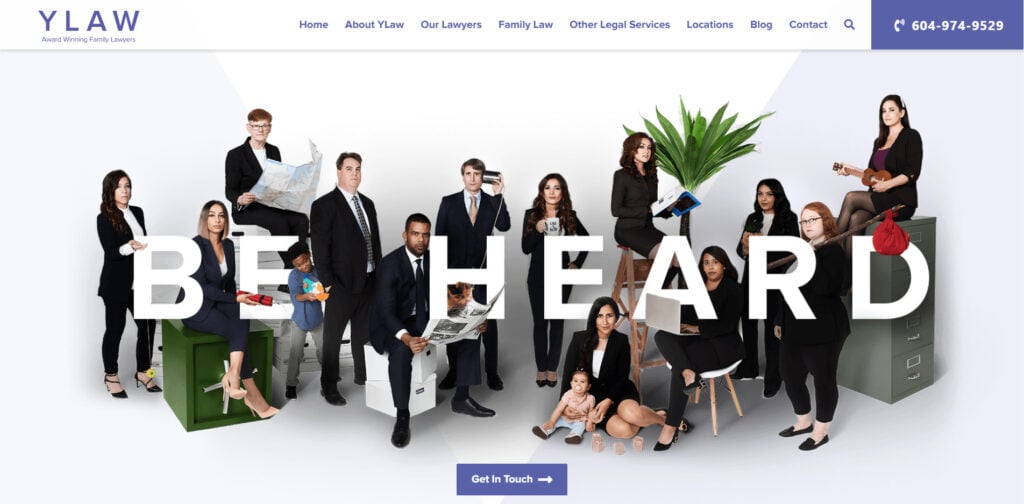
Want more clients for your family law practice? Discover top lead generation strategies with family law digital marketing. Click here to learn more!
29. Miller Thomson LLP
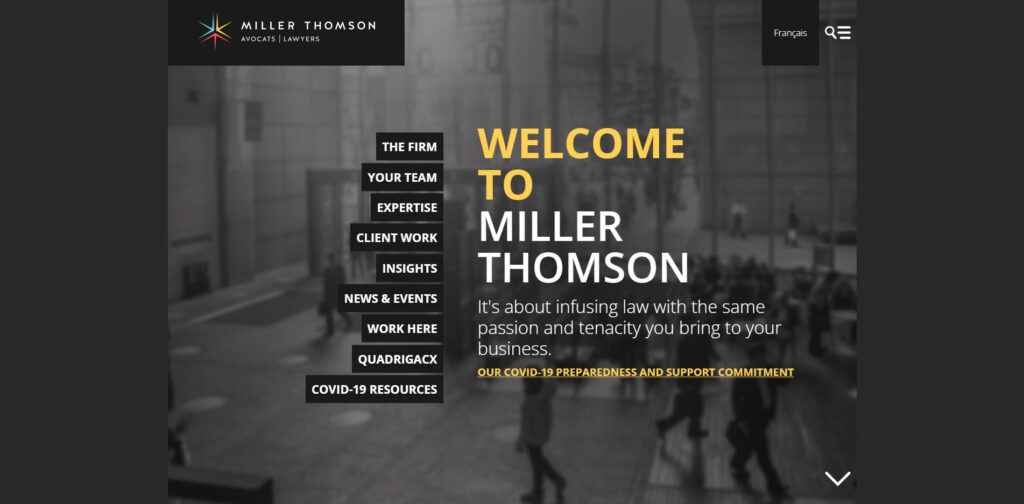
30. West Coast Trial Lawyers

31. White & Case

32. Hodgson Russ Attorneys
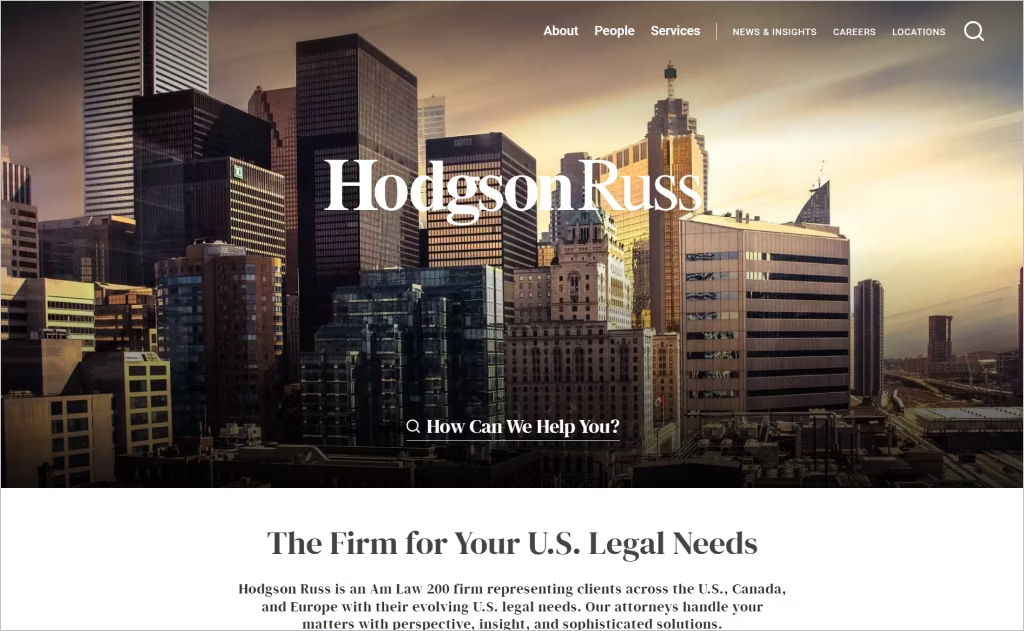
33. Dolman Law Group

34. 1800 Injured
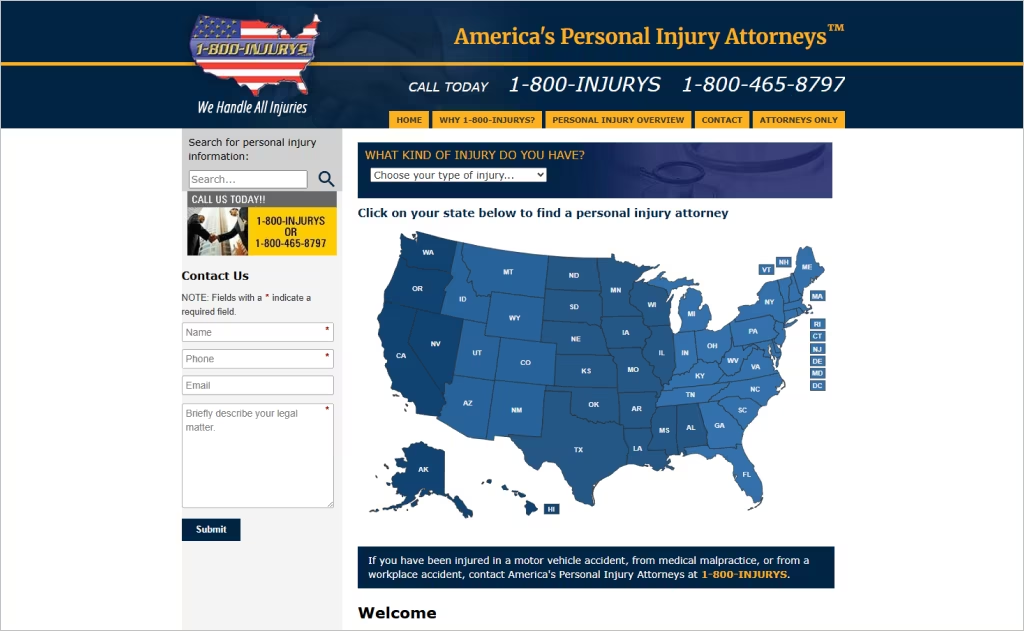
35. Chudnovsky Law

36. Cordell & Cordell
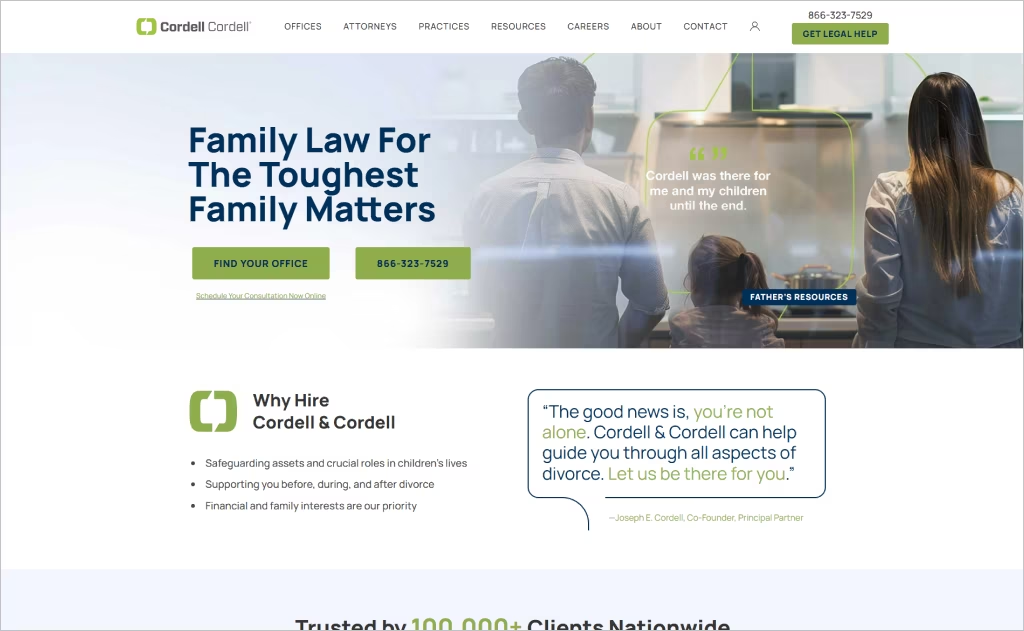
37. Taylor Janis Workplace Law
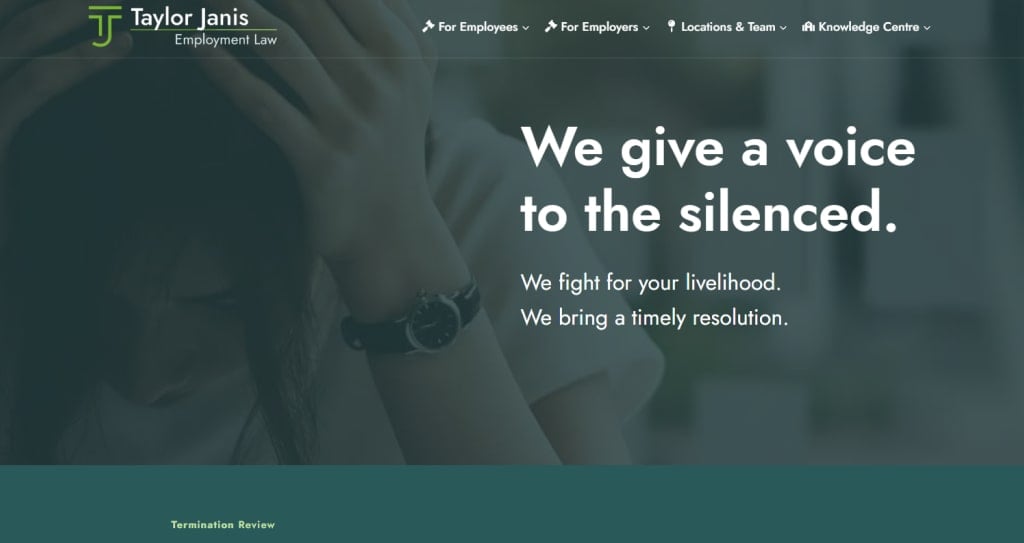
38. Miles & Stockbridge

39. Foundd Legal
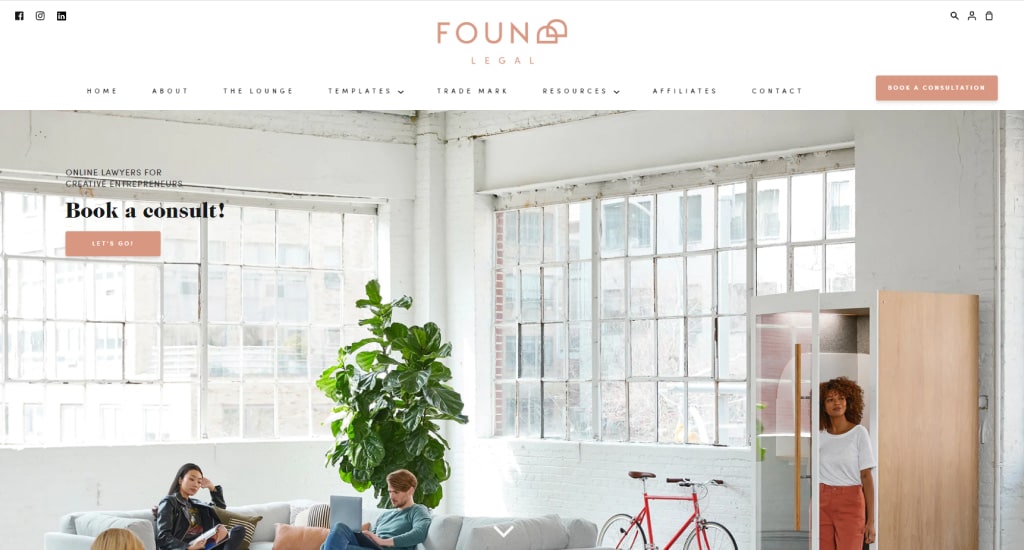
40. Gecic Law
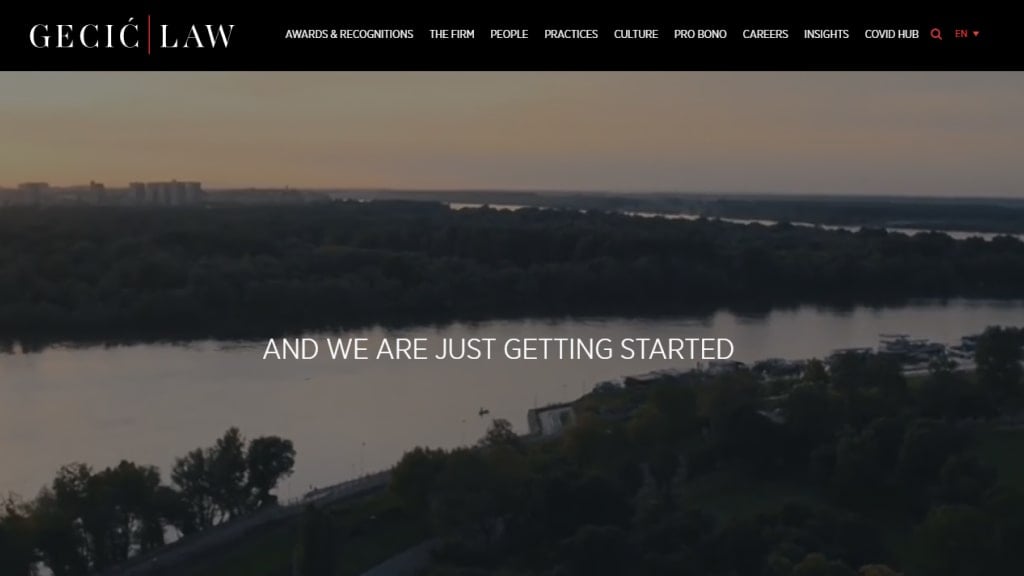
41. The Joslyn Law Firm
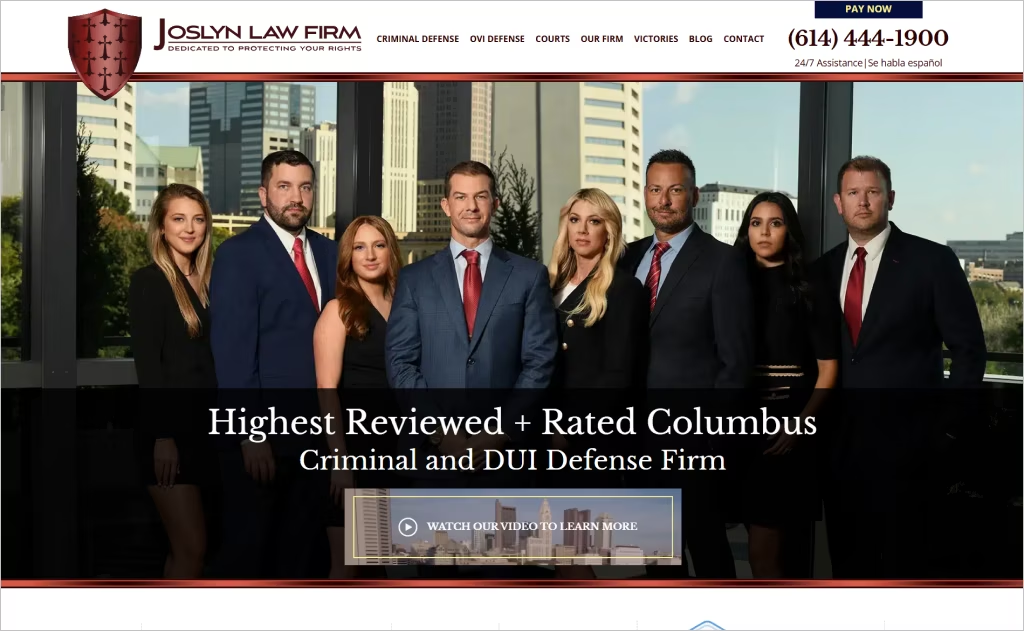
42. Parris Law Firm
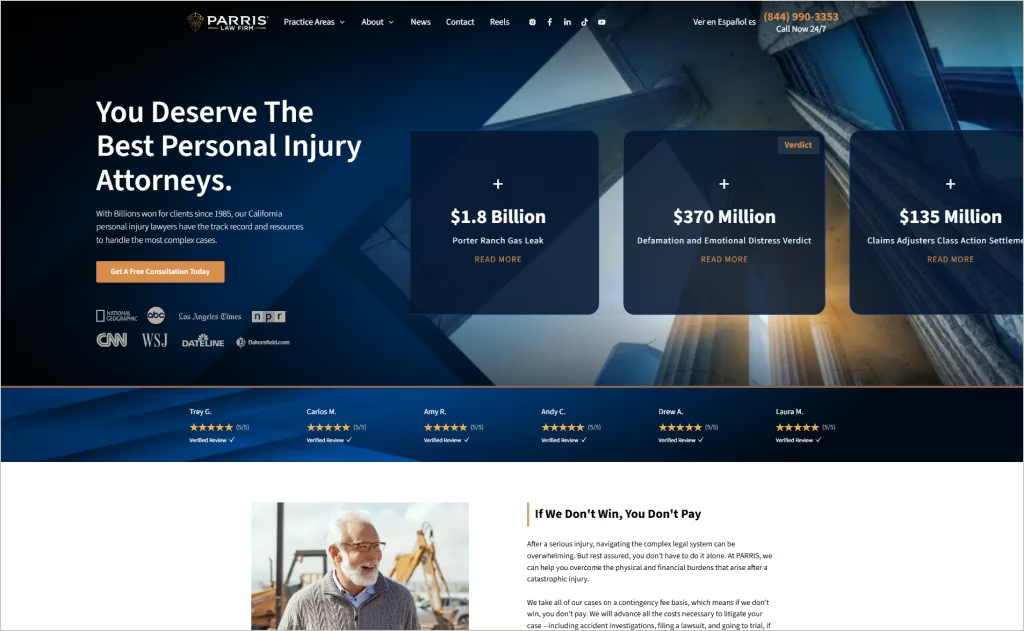
43. Zaner Harden Law
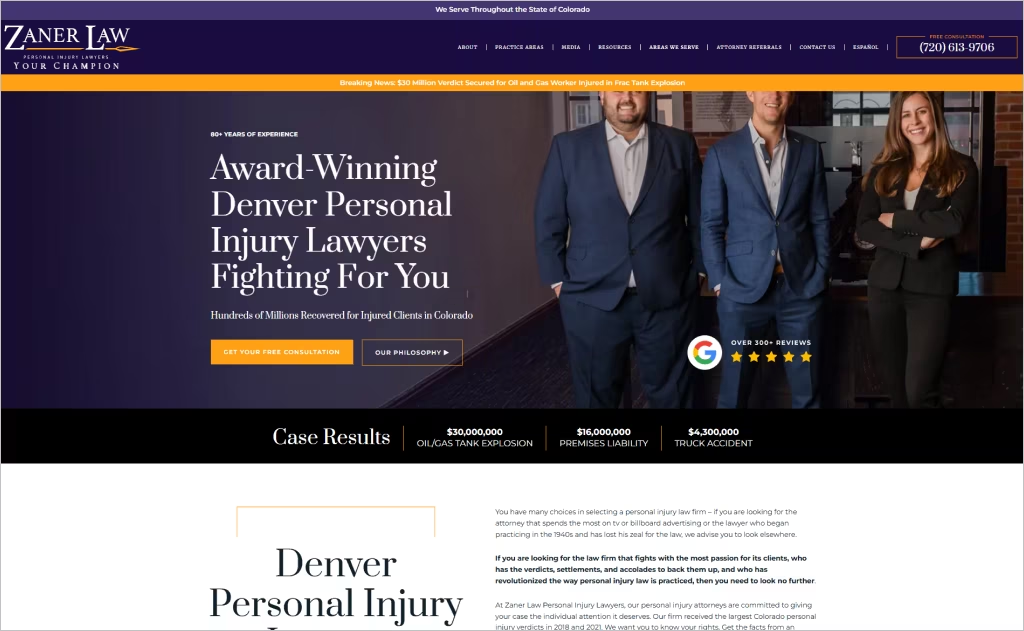
44. Oyen Wiggs
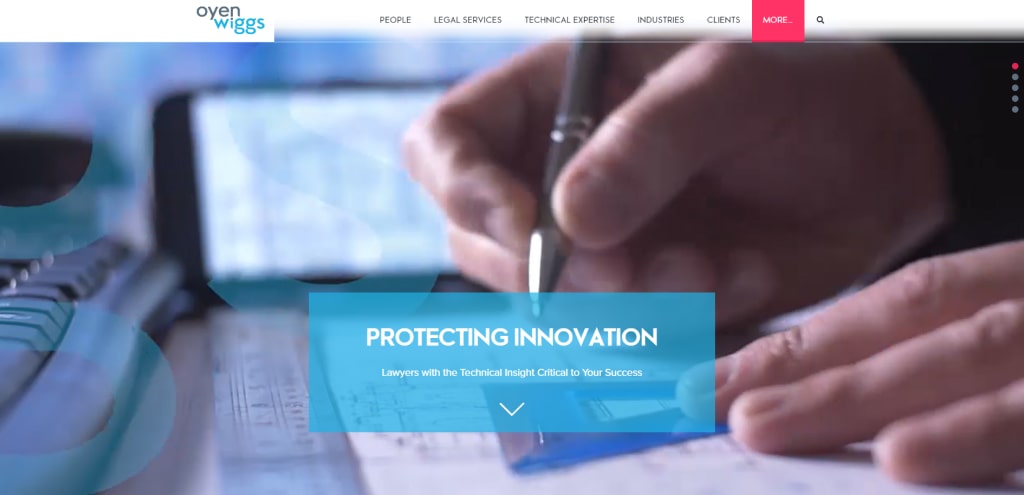
45. Tremain Artaza

46. Andreozzi + Foote
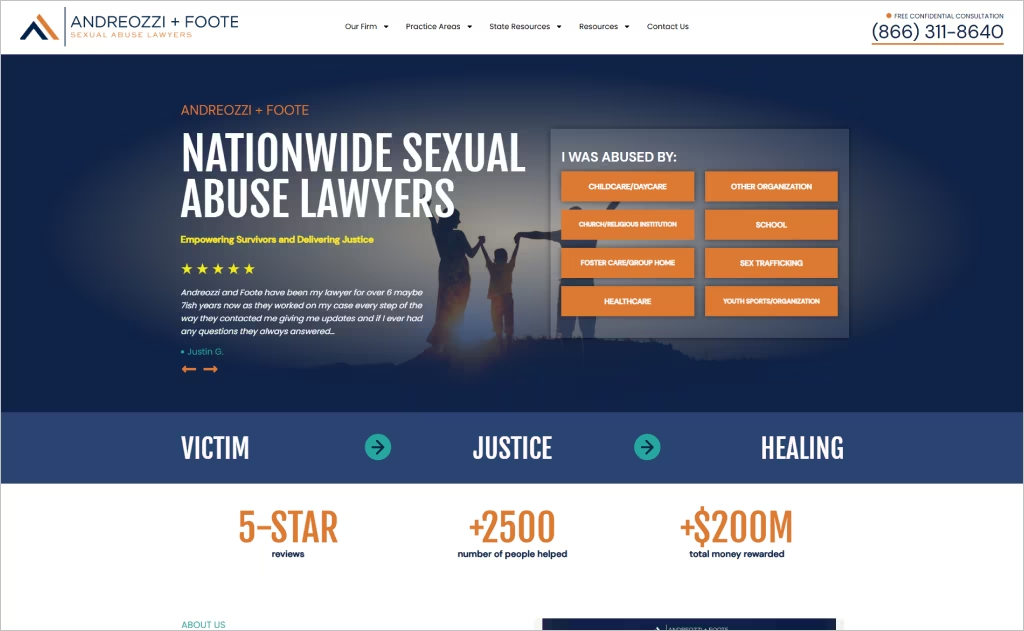
47. Vela Wood
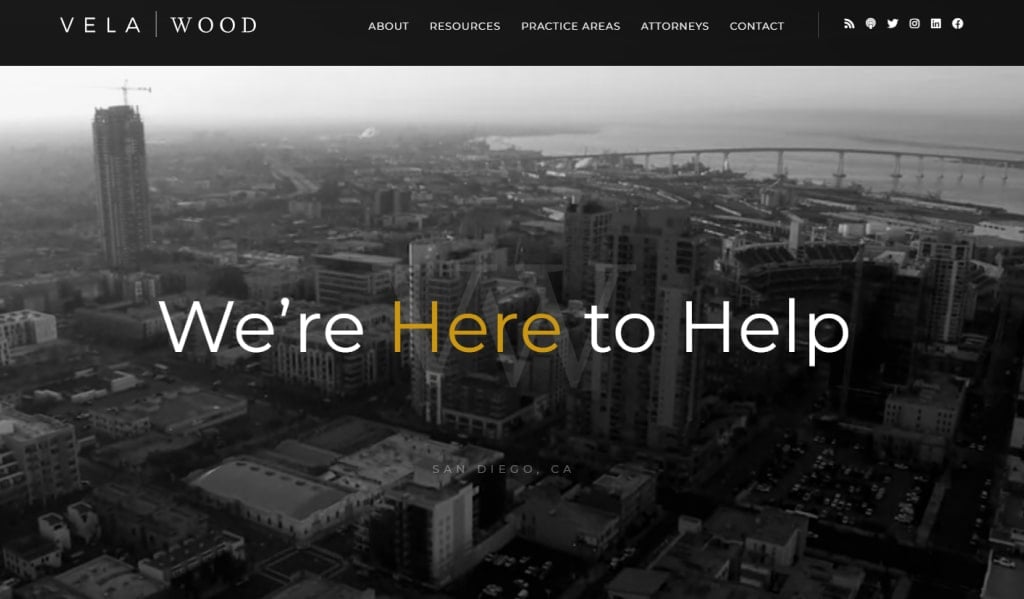
48. Kegler, Brown, Hill & Ritter

49. Bick Law LLP

50. Acapo
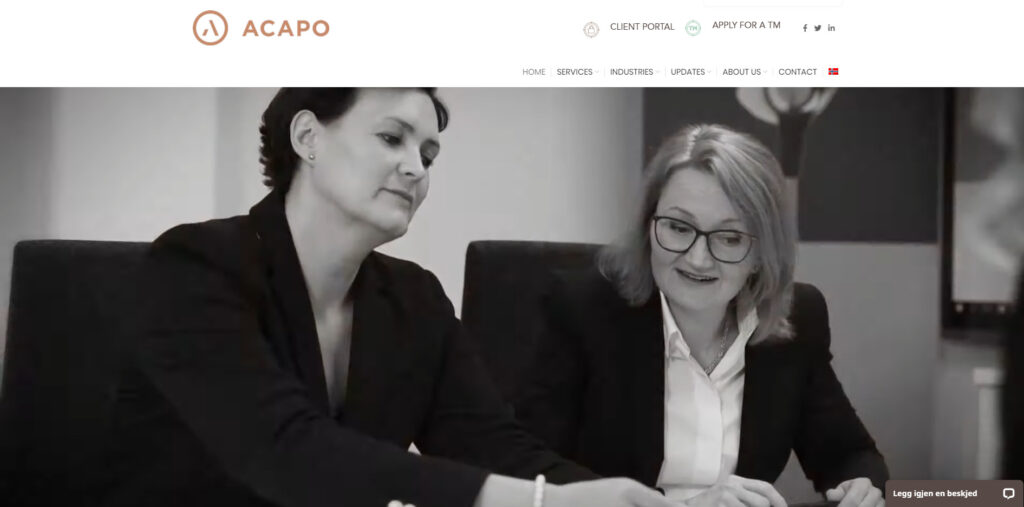
51. Robbins Firm
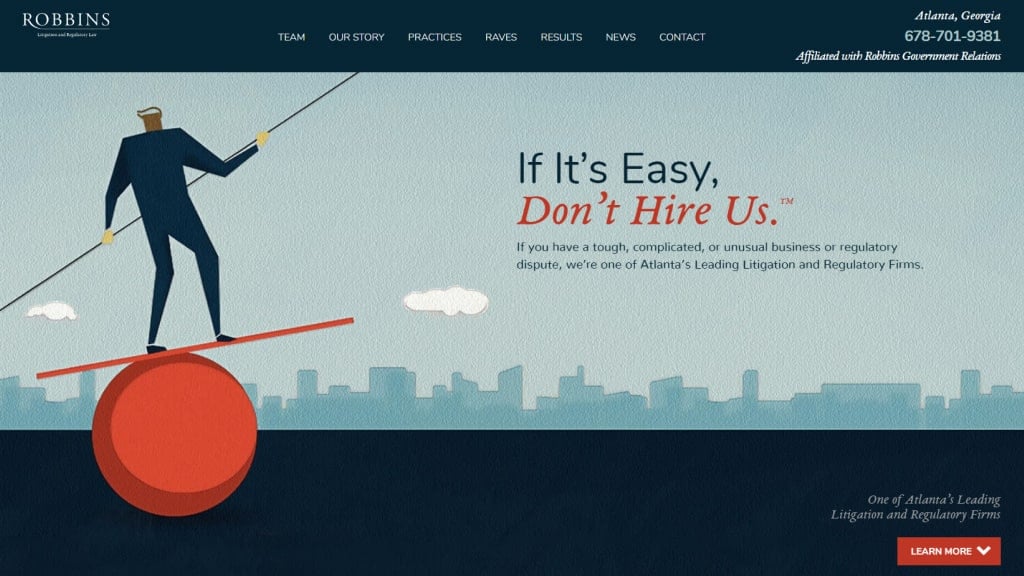
52. Strategic Criminal Defence
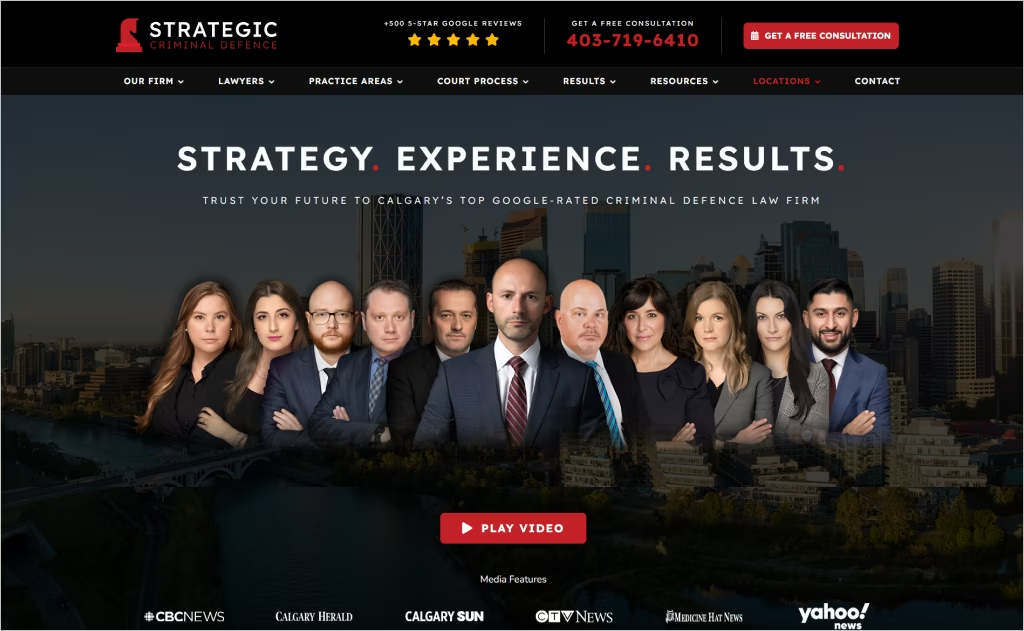
53. Bhatt Law Group

54. Litiguard Attorneys
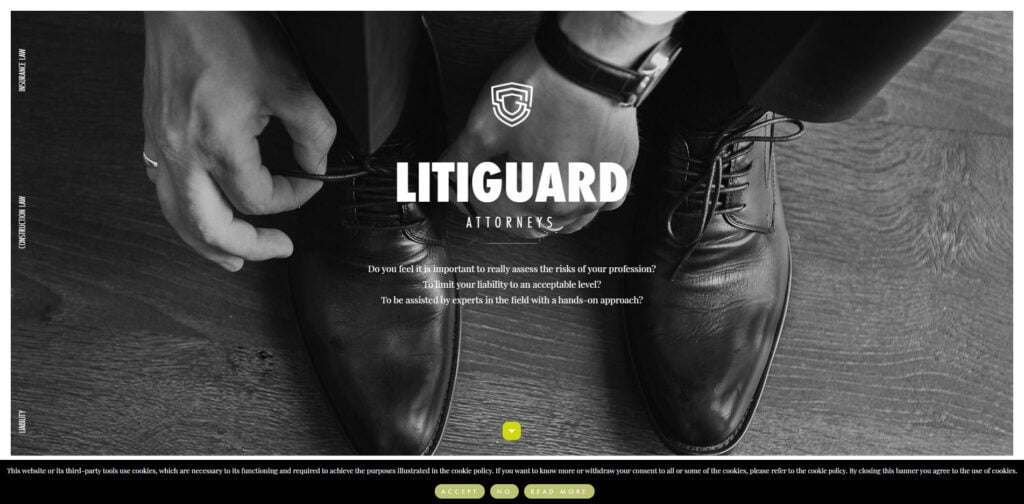
55. Brenton Legal
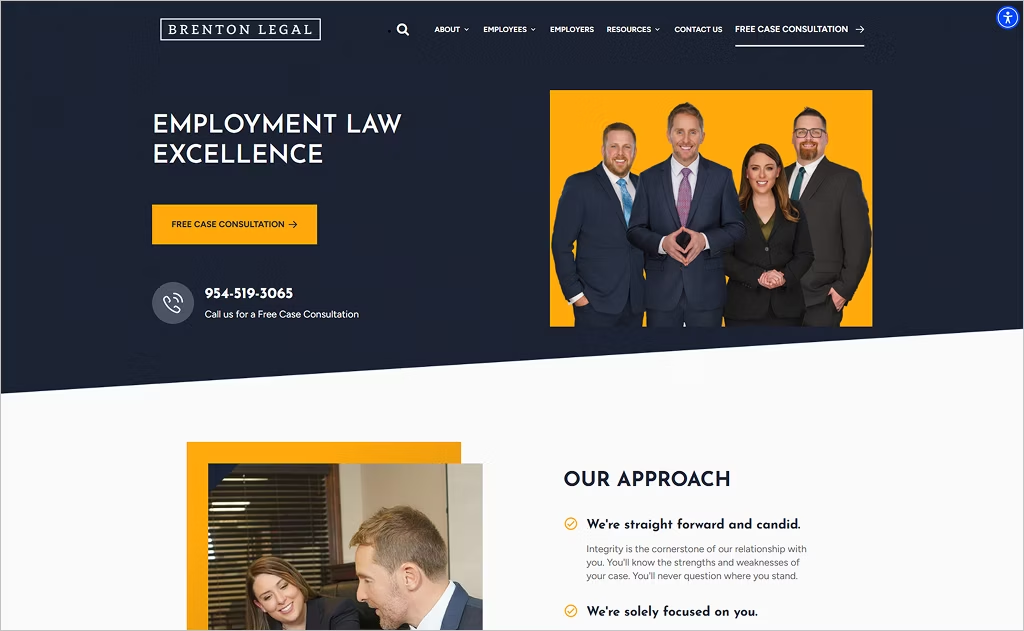
56. HopgoodGanim

57. DAHL
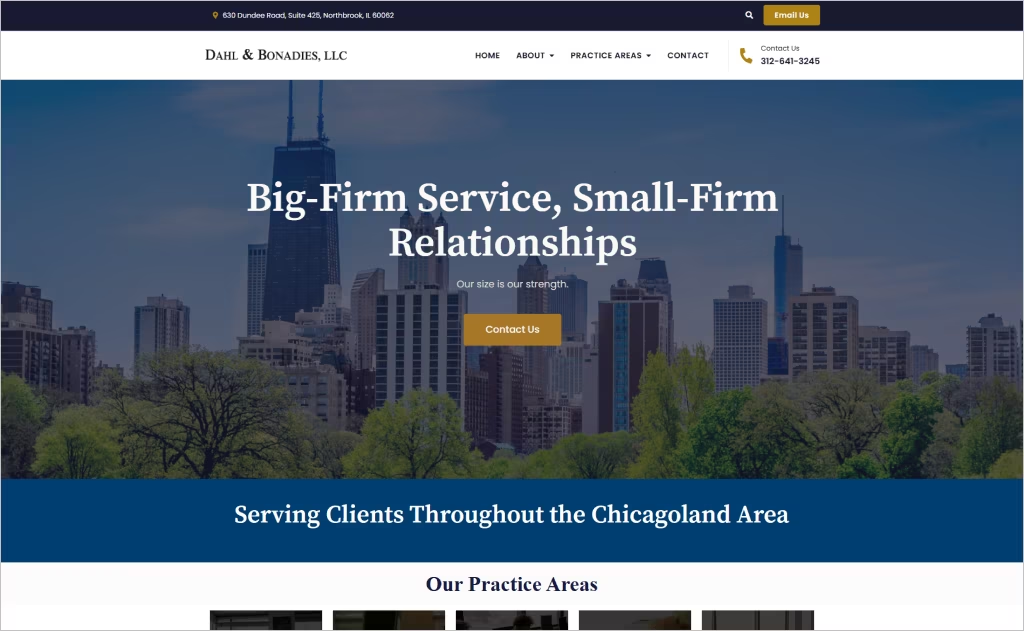
58. Houston & Alexander
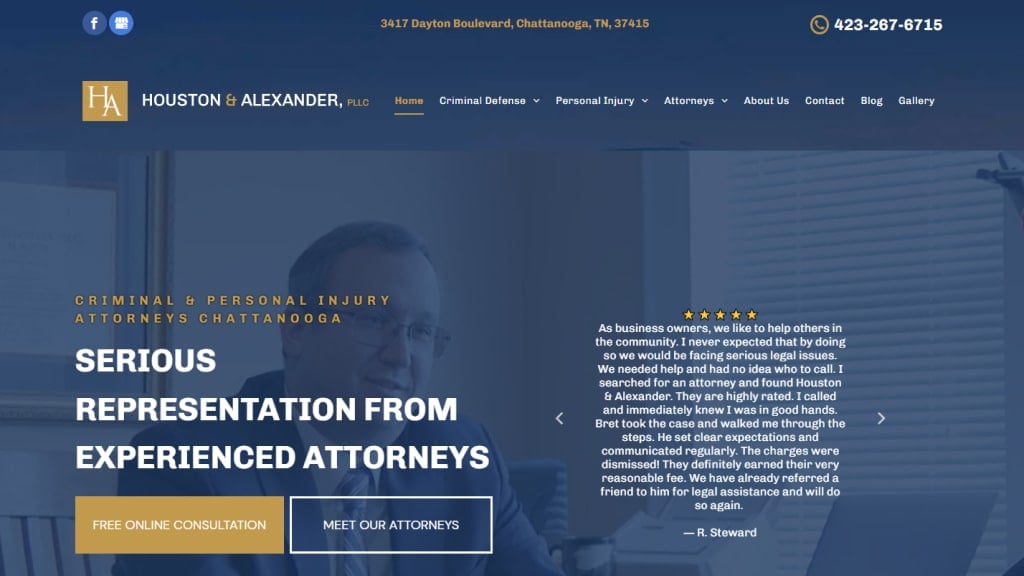
Our blog post on local SEO for lawyers reveals proven strategies to optimize your online presence.
59. Bend Law Group

60. Parikh Law
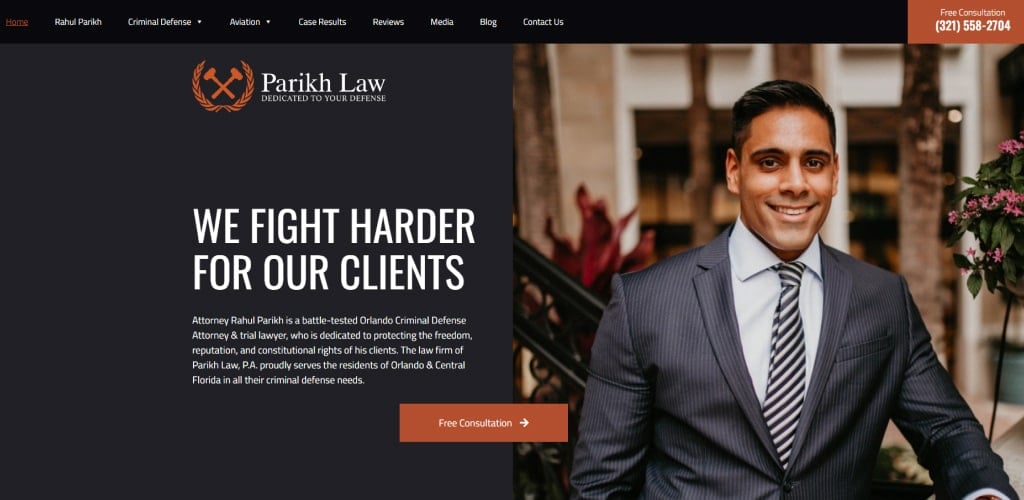

How We Evaluated the Top Law Firm Websites
To create the “best lawyer website”, you must have incredible branding. But wait, that’s not all!
Make it easy to navigate so that you attract, engage, and hook visitors instantly. When evaluating what makes a legal website successful, we look for these 4 critical rules and/or features.
1. User-Friendly Design
- Mobile-First Design: Most people will check you out on their phone first. Build for small screens before scaling up.
- Simple Navigation: Menus should be clear and intuitive. If a client can’t find your services in two clicks, you’re losing them.
- Professional Look: Use high-quality images, modern layouts, and a consistent color palette to inspire trust.
- Accessibility: Make sure your site works for everyone; screen readers, keyboard navigation, and proper contrast are essential.

2. Content & Credibility
- Clear Messaging: Use straightforward headlines that explain who you help and how. Avoid legal jargon that confuses readers.
- Helpful Content: Blog posts, FAQs, and guides show expertise and answer client questions before they even call.
- Show Proof: Highlight testimonials, reviews, and case results. Social proof builds instant credibility.
- Authentic Photos: Real team photos (not stock images) help potential clients feel a personal connection.

3. Conversion & Engagement
- Calls-to-Action Everywhere: Place clear CTAs like “Book a Free Consultation” across your site so visitors never wonder what to do next.
- Easy Contact Options: Phone, email, and chat should be one click away at all times.
- Fast Load Times: Every extra second hurts conversions. Keep your site lean and optimized.
- Engaging Media: Videos, infographics, or interactive tools (like cost calculators) keep visitors engaged longer.
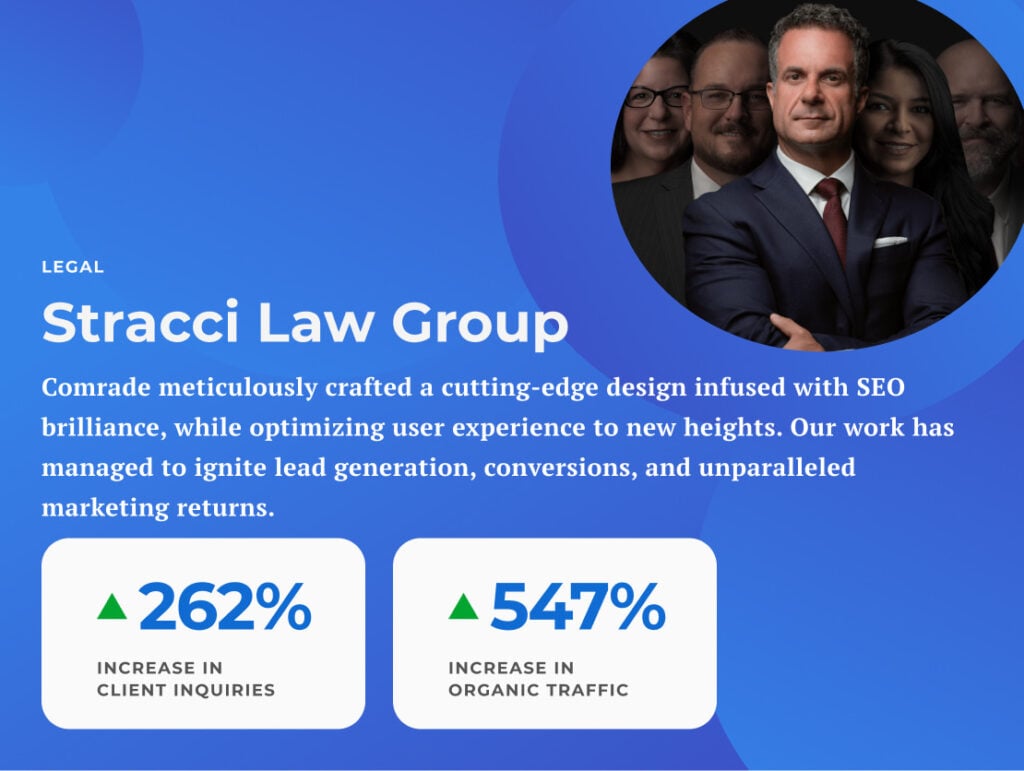
4. Technical & SEO
- SEO Basics: Use keywords your clients actually search for (like “DUI lawyer in Boston”), optimize meta descriptions, and earn backlinks.
- Secure Browsing: SSL certificates (https://) are crucial. They show clients you’re trustworthy.
- Regular Updates: A content management system (CMS) makes it easy to keep your site fresh, relevant, and bug-free.

Think about your own site: if a potential client landed there right now, would they feel confident enough to pick up the phone? Or would they click away to your competitor?
If the answer makes you hesitate, it might be time to rethink your website strategy.
Final Thoughts on the Best Law Firm Website Design Examples
You just looked at 60 of the best law firm examples in 2025! Feeling inspired?
Before you start building your own site, remember… a law firm website isn’t just about picking nice colors.
Behind the scenes, there are 20+ moving parts to get right: site speed, SEO, calls-to-action, security, mobile responsiveness… the list goes on.
In today’s market, if your website doesn’t instantly inspire trust, those leads are gone to your competitors.
Hire a professional web design agency today.
For 17+ years, Comrade has built legal websites that rank on the 1st page of Google, book more consultations, and deliver 400%–800% ROI in the first year.
